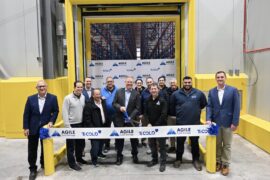Extending its established Cool Logistics events in Northern Europe and Southern Africa, London-based organizer Cool Logistics Resources Ltd has teamed up with Brazilian partner Update Comunicação Ltda to launch Cool Logistics Americas. Taking place May 14-15 in São Paulo, Brazil, the new industry event will focus on opportunities, risks and challenges for perishables trade, logistics and transport across Latin America.
Driven both by the traditional markets of Northern Europe and North America and rising demand for food prodiucts in Asia, the Middle East and Russia, the last decade has seen dramatic growth in perishable commodity exports from Central and South America, a trend that is expected to continue for some time to come. Goods including frozen beef and chicken from Brazil, bananas from Ecuador and Costa Rica, and fruit and vegetables from South America’s West Coast today play a critical role in world perishables supply and are important export earners for their producing countries.
South America alone now accounts for an estimated 30% of global refrigerated exports, according to the UN Economic Commission for Latin America (ECLAC), one of the most important sources of market data on the Latin perishables trade and a member of the Cool Logistics Americas industry advisory group. ECLAC’s Ricardo Sanchez will update attendees on the latest industry statistics at the conference, along with Andrew Lorimer of Brazilian trade analyst Datamar.
Yet despite the growing importance of South-North and South-South trades, Latin reefer box traffic is increasingly at the mercy of larger shifts within global container trades, said Rachael White, joint managing director of Cool Logistics Resources. “Carriers have been pouring mega vessels onto the major dry box East-West trades in an attempt to cut slot costs and stem losses. But with ever-larger ships being cascaded into Latin trades and other ‘secondary’ routes as a result, what will more trans-shipment, service consolidation and the prospect of slow steaming mean for the region’s perishable exporters?”
The future shape of Latin maritime logistics will be a main topic of debate in Sao Paulo, with speakers including Julian Thomas, head of Hamburg Süd’s East Coast South America operations and regional carrier Aliança, Mario Velado, cluster sales manager for Maersk Line in Brazil, and Mauricio Padron, regional commercial manager, South America for specialist reefer operator LauritzenCoolLogistics.
Panama Canal expansion and its specific impact on Latin reefer trade flows and port networks will also come under the spotlight in a panel featuring Paul Gallie, managing director of new Costa Rica terminal APM Terminals Moin, Giovanni Benedetti of Colombia’s Port of Cartagena, and Robert Ahern at PSA Panama.
The other major focus of attention will be “the first mile” – getting perishables from point of production to port of export. This is perhaps the biggest area of concern today, according to Martin von Simson, managing partner of Update Comunicação. “Logistics infrastructure in Brazil and the wider Latin market is really playing catch-up and this is one of the issues causing the unacceptably high waste and losses that we see today in the region’s perishable exports,” said von Simson.
“However, infrastructure is by no means the only issue,” noted von Simson. “Knowledge of good cold chain management and what modern refrigerated equipment and technology can and cannot do to prolong life of products such as fresh fruit and vegetable, fish and meat is also lacking, along with access to this equipment.” For instance, it’s reported that 95% of frozen meat and poultry shipped from Brazil is transported to ports without active cooling, even when trucking distances can exceed 3,000 kilometers.
Major Brazil produce organizations supporting the new event include poultry association UBABAEF, and beef trade association ABEIC and pharmaceutical logistics body ANFARLOG. For additional information, check out the organizer’s website at www.coollogisticsamericas.com.





